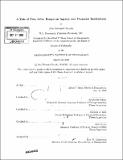| dc.contributor.advisor | Antoinette Schoar, Stephen A. Ross and Dirk Jenter. | en_US |
| dc.contributor.author | Kondo, Jiro Edouard | en_US |
| dc.contributor.other | Sloan School of Management. | en_US |
| dc.date.accessioned | 2009-06-30T16:40:38Z | |
| dc.date.available | 2009-06-30T16:40:38Z | |
| dc.date.copyright | 2008 | en_US |
| dc.date.issued | 2008 | en_US |
| dc.identifier.uri | http://hdl.handle.net/1721.1/45933 | |
| dc.description | Thesis (Ph. D.)--Massachusetts Institute of Technology, Sloan School of Management, 2008. | en_US |
| dc.description | Includes bibliographical references (p. 123-128). | en_US |
| dc.description.abstract | This thesis consists of two essays covering topics in the economics of financial institutions with an emphasis on certain types of potential agency problems. In particular, it investigates two radically different types of "arbs": arbitrators and arbitrageurs. The first essay studies securities arbitration to shed light on a relevant form of financial regulation that was previously unexplored empirically: the self-regulation of financial markets. The second essay investigates the informable financing channel in the context of arbitrageur fund-raising to develop a theory of the limits to arbitrage. Further details of each essay are included below:In Chapter 1, I investigate whether self-regulation in financial markets leads to greater industry bias and expertise in enforcement. Using hand-collected data on securities arbitration disputes from the National Association of Securities Dealers (NASD), I document that pro-industry arbitrators are selected more often to arbitration panels than pro-investor ones (selection on bias) and that experts are also selected more frequently to cases (selection on expertise). Moreover, both patterns vary substantially across cases. Selection on bias is strongest when large brokerage firms are sued and when cases are more important to firms while selection on expertise increases with case complexity. This suggests that arbitrators are assigned to cases in ways that lead to higher industry bias and expertise. To assess whether the NASD is responsible for these patterns, I examine the impact of a change in regulation that greatly reduced NASD control over the selection of arbitrators. Following this change, the allocation of expertise to cases declined while selection on bias increased. These findings suggest that the NASD is not responsible for selection on bias but that it increases selection on expertise. Thus, concerns about favoritism at the NASD may be misplaced and, more generally, self-regulation may increase expertise and even lower industry bias in enforcement. | en_US |
| dc.description.abstract | (cont.) In Chapter 2 (joint work with Dimitris Papanikolaou), we proposes a theory for the limits to arbitrage based on financial relationships between arbitrageurs and banks. Financially constrained arbitrageurs may choose to seek additional financing from informable financiers (e.g., banks) who are initially unaware of their strategy but can understand it if it is disclosed to them. However, a hold-up problem arises because these banks cannot commit to provide capital and have the financial technology to profit from the strategies themselves. Understanding this, arbitrageurs choose to keep their strategies private and stay financially constrained. This limits their correction of mispricing unless banks have sufficient reputational capital to commit not to expropriate the arbitrageur. Using the framework of stochastic repeated games, we show that this form of limited arbitrage arises when mispricing is largest and becomes more substantial as the degree of competition between banks intensifies and arbitrageur wealth increases. More generally, it is argued that this pattern of "underinvestment" in the most profitable states is likely to occur in other settings where informable finance plays a prominent role and intellectual property rights are difficult to enforce (e.g., in the financing of innovation). | en_US |
| dc.description.statementofresponsibility | by Jiro Edouard Kondo. | en_US |
| dc.format.extent | 128 p. | en_US |
| dc.language.iso | eng | en_US |
| dc.publisher | Massachusetts Institute of Technology | en_US |
| dc.rights | M.I.T. theses are protected by
copyright. They may be viewed from this source for any purpose, but
reproduction or distribution in any format is prohibited without written
permission. See provided URL for inquiries about permission. | en_US |
| dc.rights.uri | http://dspace.mit.edu/handle/1721.1/7582 | en_US |
| dc.subject | Sloan School of Management. | en_US |
| dc.title | A tale of two arbs : essays on agency and financial institutions | en_US |
| dc.title.alternative | Essays on agency and financial institutions | en_US |
| dc.type | Thesis | en_US |
| dc.description.degree | Ph.D. | en_US |
| dc.contributor.department | Sloan School of Management | |
| dc.identifier.oclc | 320854681 | en_US |
